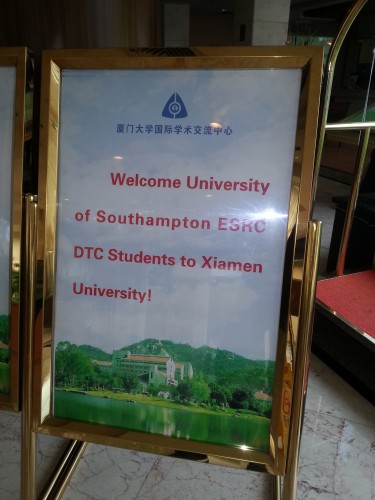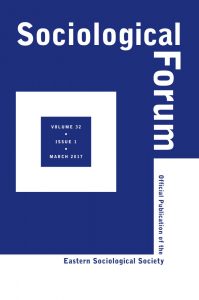Doing social research in China: a beginners’ guide.
Last month I had the privilege of going to Xiamen University in south-eastern China for a ten-day research trip, along with ten other social science PhD students from my department at Southampton University. The purpose of the trip was to give us an opportunity to do a research project with ten Chinese PhD counterparts, and to give us a feel for what some of those buzzwords of contemporary academia – ‘global’, ‘networking’, ‘collaboration’, ‘inter-disciplinarity’ – might actually mean in practice. It turns out that these vague and perhaps glamourous-sounding platitudes hide a reality full of practical and cultural challenges (and rewards) that I didn’t know existed. I finished my ten days in Xiamen feeling rewarded, enlightened, a bit wiser, and rather knackered.
On our first day we were put into small groups which included both Southampton and Xiamen students, and told by our professors that we had a week to start a research project, identify our research questions and start collecting data. I must admit that at first, things didn’t look great. The Chinese member of our four-strong group, ‘Bree’ (her english name) was rather shy using English, and our research interests did not converge neatly. We were Tristan, a Geographer from France; Kun, an education researcher (UK-based but originally from China); Bree, a political philosopher from China; and me, a sociologist Brit. The idea of agreeing on a topic which interested all of us, and for which we could collect decent data in a week seemed optimistic, let alone the task of actually collecting the data itself! The intense heat, humidity and jetlag probably also contributed to a sense of impending, inevitable, failure.
Day two was a little more positive. After coming up with several suggestions and rejecting them, we managed to agree on the research topic of environmental behaviours and attitudes among Chinese students, with the possibility of comparing them with students back in Southampton. We decided to use focus groups as our research method, because (a) focus groups are a pretty efficient way of collecting rich data from a lot of people in a short time, and (b) we thought focus groups might show us to what extent there was agreement or disagreement on the issues of ‘green’ behaviour. In addition, we also decided to look at international students who had moved to China, and whether their ‘green norms’ had been affected or not by the move to a new country.
Challenge number one was that I was the only person who had ever used focus groups before, so I had to ‘train’ my team members, as best I could, in ‘good practice’ as a focus group moderator. Challenge number two was that in China, focus groups are not a common research method at all. The whole concept of focus groups needed explaining to Bree, and to our Chinese participants. As we would find out, the Chinese students could prove to be quite shy and reserved when asked to discuss an issue with strangers, so it took some skill to get them to talk.
Challenge three was recruiting participants. It turns out that Chinese students don’t check their email very much, so doing a mailout to student email addresses (as I probably would have done in the UK) would have been, we were told, a waste of time. Instead, ‘WeChat’, the ubiquitous Chinese smartphone app (similar to WhatsApp) was the way to contact participants. But before we turned to our smartphones, we made initial contact the old-fashioned way: going around campus, pestering people to take part in our focus groups, and taking their phone numbers. The fact that we were able to offer a 50RMB ( about £5 or $8) incentive per participant no doubt helped us quickly reach our target, and in the end we were able to hold five focus groups: three with Chinese students and two with international students. We used WeChat to contact participants with venue/time details of the focus groups and, magically, everyone turned up! (N.B. Never underestimate the power of bribery.)
The focus groups went well, in the main, although of course some groups were far more talkative than others. By the end of the focus groups I think all four of us could agree that being a focus group moderator is extremely demanding. Balancing the need to ‘look’ attentive, to keep an eye on time, to encourage quiet participants to speak up (whilst trying to get overly chatty participants to politely shut up and let others speak), think of follow-up questions, and make sure you are collecting the ‘golden’ data you are looking for is more than enough work for any one brain for sixty minutes. Doing all that in a strange environment far from home (did I mention the heat and humidity?) can also mean one is liable to get distracted.
But we did it! We got our data, we recorded it, and we will in time transcribe the focus groups (translating the Chinese ones into English); conduct more focus groups back in Southampton; analyse the results; and hopefully write a publishable paper over the coming months.
So what did actually we find out? Our initial findings showed that whilst there might be some social pressure to be ‘green’ among sections of society in western countries, that kind of consciousness is not there in China, at least not yet. Much of that might be explained by the low cost of using resources in China, which makes it easy to be wasteful. Our students gave the examples of domestic energy and printing. Many students said it was common to leave lights or appliances on (especially AC units – did I mention?…) even when not in use, or to print off entire copies of books (often downloaded illegally, natch) just because it was so cheap to do so.
Another interesting theme was the one of responsibility for the environment being placed not so much with the individual citizen/consumer, but with higher authorities (such as university managers, city councils, national government). For example, in some student dormitories, the uni bosses switch off the lights at midnight, preventing students from excessive energy use (and also, excessive parties). When it comes to litter, many Chinese students said that they felt little compulsion to pick up their litter or sort their recycling, because they knew that someone else would do it for them. There seemed to be an assumption that individuals would do whatever they wanted and the State would literally pick up the pieces afterwards.
Lastly, one other interesting finding was how the international students saw themselves responding to their new home in China. Some students from western countries told us that in their home it was ‘cool to be green’ and so they tried to act as a kind of ambassador for their country, and as a role model to their Chinese peers to be more green, by say, reducing energy use, printing less, or recycling more. In contrast, others told us that they worried that they were ‘going native’, and were being more wasteful and less green, perhaps because of the cheap price of resources in China, or perhaps because of the lack of ‘green is cool’ social pressure from their Chinese peers.
When we repeat our focus groups in the UK, it will be interesting to see if these trends are reversed so that when students from China come to a western country, where green social norms are far more prominent, they ‘assimilate’, or they simply maintain their original behaviour and attitudes. Whatever we learn about those substantive sociological issues going forward, the trip to Xiamen certainly has already taught us all a lot about methodological challenges of working outside one’s comfort zone. It was worth the jetlag, every penny spent on the trip by the ESRC (I hope), and every drop of sweat. Because… did I mention the humidity?








1099-0860/asset/NCB_logo.gif?v=1&s=40edfd0d901b2daf894ae7a3b2371eabd628edef)

Hi, I am looking at running a focus group with Chinese students here in the UK and wondered if you had any tips or a copy of the layout from the successful focus groups that you held?
Hi Max,
There is very little difference doing a FG with Chinese students, or any other students. We were lucky to have a bilingual member of our team who could conduct the FGs in either english or mandarin. The participants felt more comfortable in Mandarin so we used that and then translated afterwards. Not sure if you’re able to do the same but you might get richer data if you can use their mother tongue. Depends on their fluency.
As for the format for FGs, Naomi Henderson has a lot of tips. She’s in marketing, but the principles apply for any FG. Here’s one link that might help. Good luck!
https://archive.ama.org/archive/ResourceLibrary/MarketingResearch/documents/16103538.pdf
Hi Max,
There is very little difference doing a FG with Chinese students, or any other students. We were lucky to have a bilingual member of our team who could conduct the FGs in either english or mandarin. The participants felt more comfortable in Mandarin so we used that and then translated afterwards. Not sure if you’re able to do the same but you might get richer data if you can use their mother tongue. Depends on their fluency.
As for the format for FGs, Naomi Henderson has a lot of tips. She’s in marketing, but the principles apply for any FG. Here’s one link that might help. Good luck!
https://archive.ama.org/archive/ResourceLibrary/MarketingResearch/documents/16103538.pdf